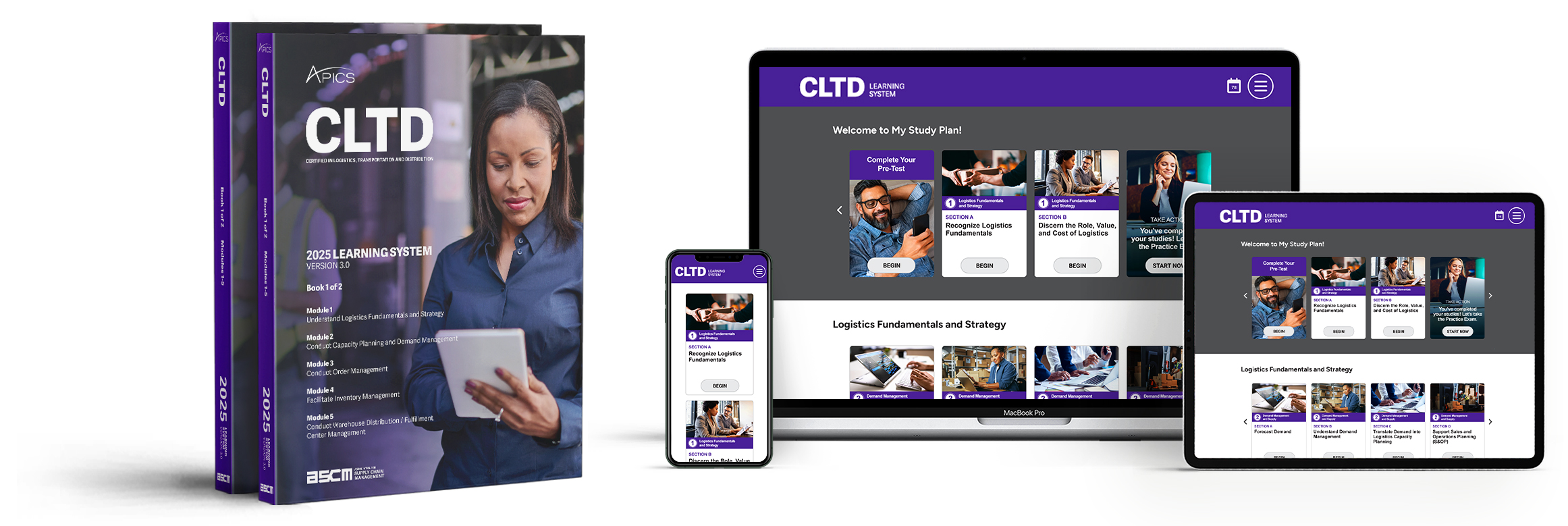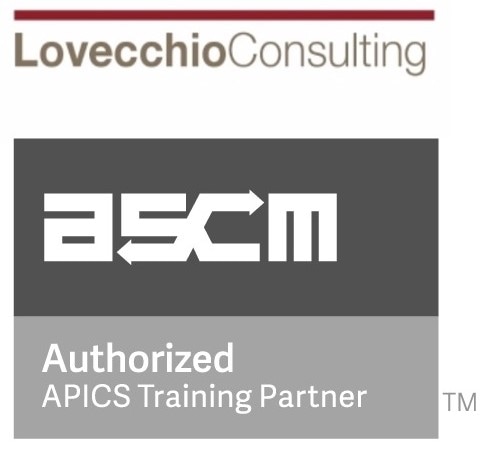
CORSO APICS CLTD - LIVE ONLINE - NUOVA VERSIONE
LIVE ONLINE APICS CLTD COURSE - NEW VERSION
(Certified in Logistics, Transportation and Distribution)
-
Obiettivo
Questo corso sviluppa le competenze necessarie per conseguire la certificazione internazionale in logistica "Certified in Logistics, Transportation and Distribution (CLTD)" dell'APICS, la maggiore organizzazione globale in operations e supply chain.
-
Benefici
Adottare standard e protocolli in ambito logistica distributiva diventa importante per distinguersi, grazie ad un approccio metodologico, ed essere riconosciuti come esperti nella materia, in modo da proporre e realizzare le giuste soluzioni, così come professionisti certificati CLTD già dimostrano dal 2016.
-
Objective
-
This course develops the skills to get the international certification “Certified in Logistics, Transportation and Distribution (CLTD)” by APICS, the global leader in supply chain certifications.
-
Benefits
Adopting standard and best practices in logistics management is key to stand out from the crowd with a methodological approach, and be recognized as experts in the field, in order to advice and apply the right solutions, as many professionals CLTD certified demonstrate since 2016.
Luogo del corso/place: live online
Date di avvio/Starting dates - current year:
| JAN | FEB | MAR | APR | MAY | JUN | JUL | SEP | OCT | NOV | DEC |
| 19 |
9 |
11 |
17 |
|
Orario / Time: Dalle 18.00 alle 21.00 - From 6.00 p.m. to 9.00 p.m. (Rome time GMT+1)
Numero totale sessioni /Number of sessions: 12
Altre sessioni: ogni lunedi successivo con sessioni di durata di 3 ore ciascuna / Other sessions: every next monday with each session of a 3-hour duration.
Durata totale/Total duration: 36 ore / 36 hours
Il corso è erogabile in italiano, inglese o francese/ The course can be held in italian, french or english.
Oltre il corso, sono necessarie almeno 80 ore di studio individuale per prepararsi all'esame / Beyond the course, at least additional 80 hour of self study are necessary to do the exam.
CONTENUTI PRINCIPALI / MAIN CONTENTS
Module 1: Logistics Fundamentals and Strategy
- Section A: Recognize Logistics Fundamentals
- Section B: Discern the Role, Value, and Cost of Logistics
- Section C: Develop Logistics Strategy within the Supply Chain
Module 2: Demand Management and Supply
(Capacity Management)
- Section A: Forecast Demand
- Section B: Understand Demand Management
- Section C: Translate Demand into Logistics Capacity Planning
- Section D: Support Sales & Operations Planning (S&OP)
- Section E: Support Distribution Requirements Planning (DRP)
- Section F: Understand Master Scheduling and Material Requirements Planning
- Section G: Facilitate Sourcing and Procurement
Module 3: Customer and Order Management
- Section A: Enable Customer and Relationship Management (CRM)
- Section B: Enable Outbound and Inbound Order Management
Module 4: Warehouse Distribution/Fulfillment
Center Management
- Section A: Identify Warehouse Strategy, Ownership, and Roles
- Section B: Formulate Warehouse Processes and Order Flow
- Section C: Evaluate Warehouse Facility Layout Decisions and Manage Performance
- Section D: Incorporate Packaging
- Section E: Incorporate Materials Handling and Warehouse Automation
Module 5: Inventory Management
- Section A: Understand Inventory Management Fundamentals
- Section B: Develop Inventory Strategy and Policy and Implement Inventory Control
Module 6: Transportation Management
- Section A: Understand Transportation Fundamentals
- Section B: Identify Road Transportation Characteristics
- Section C: Identify Rail Transportation Characteristics
- Section D: Identify Air Transport Characteristics
- Section E: Identify Water (Ocean and Inland Waterway) Transportation Characteristics
- Section F: Identify Multimodal, Multi-Stop, and Characteristics of Other Modes
- Section G: Implement Transportation Management
- Section H: Conduct Transportation Administration
Module 7: Global Logistics
- Section A: Characterize the International Environment and Global Infrastructure
- Section B: Incorporate Regulations into Global Logistics Processes
- Section C: Facilitate Export/Import, Customs Clearing, and Documentation
- Section D: Understand Finance, Payment, Currency, and Tax Options/Implications
Module 8: Sustainability, Reverse Logistics,
and Risk Management
- Section A: Apply Sustainability Principles
- Section B: Incorporate Reverse Logistics
- Section C: Incorporate Risk Management Principles
Module 9: Logistics Framework, Metrics,
Network Design, Transformation,
and Improvement
- Section A: Design the Logistics Framework
- Section B: Coordinate Strategic Performance Management
- Section C: Facilitate Facilities Planning and Network Design
- Section D: Coordinate Digital Transformation and Continuous Improvement
Il materiale didattico e l'esame APICS per ottenere la certificazione sono in inglese. / The course material and the APICS exam are in english.
DOCENTE: GIUSEPPE LOVECCHIO, SME for the current new version 2025, that follows the APICS CLTD Exam Content Manual (ECM) version 3.0.
Giuseppe Lovecchio is APICS Master Instructor, Subject Matter Expert, part of the ASCM Subcommitte updating CSCP and CLTD learning systems, and of the ASCM technical contributors team, updating SCOR to SCOR DS
Demand Driven Endorsed Instructor
CLICCA QUI PER LA BROCHURE APICS CLTD /CLICK HERE FOR THE CLTD SHEET
-
Clicca qui per il Subject Matter Expert
- CLICCA QUI PER UN VIDEOCLIP SUL CLTD / CLICK HER FOR A VIDEOCLIP ON CLTD
- CLICCA QUI PER IL VIDEO SUL CLTD / CLICK HER FOR THE VIDEO ON CLTD
- ALTRI CORSI APICS /OTHER APICS COURSES
- Which APICS certification is right for me ? click here
- Corso CPIM: clicca qui
- CPIM course : click here
-
CSCP course:
click here
- CLICCA QUI PER LA POLITICA SULLA PRIVACY / CLICK HERE FOR THE PRIVACY POLICY
CLICCA QUI PER IL CATALOGO CORSI
CLICK HERE FOR THE COURSE CATALOGUE
CLICCA QUI PER ALTRI CORSI ONLINE DAL VIVO / CLICK HERE FOR OTHER LIVE ONLINE COURSES
